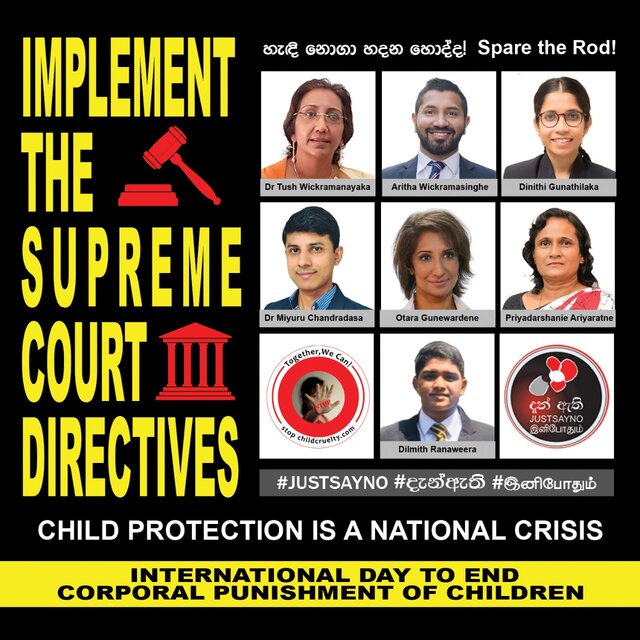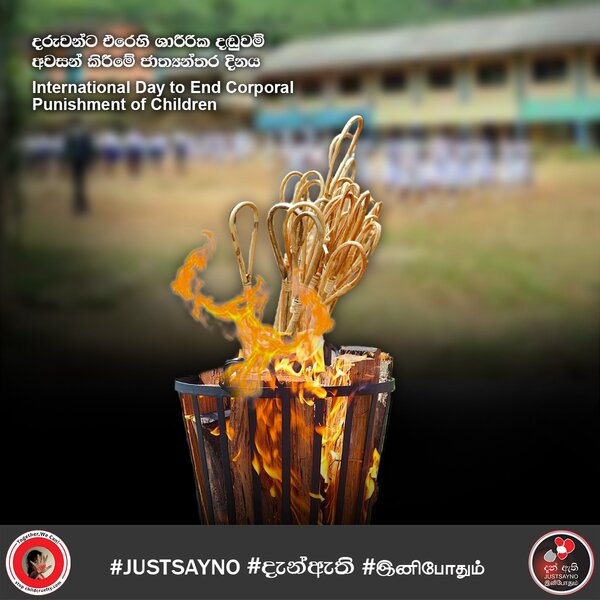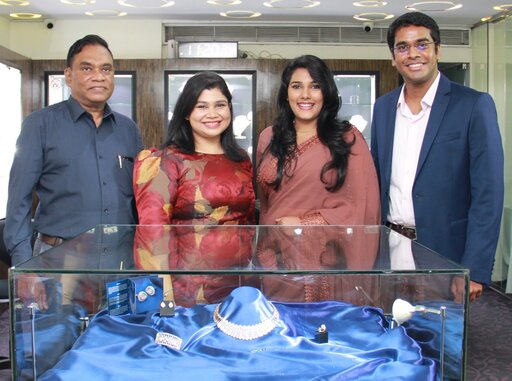Child Protection is a National Crisis – Sri Lanka has fallen to the abysmal 10% of countries safest in the world for children against violence. Corporal Punishment is the most common form of violence against children.
Stop Child Cruelty Trust (SCC) spearheads another landmark campaign to raise awareness on April 30th, International Day to End Corporal Punishment of Children, the first time this day is highlighted in Sri Lanka. ‘Spare the Rod’ is a campaign fuelled by experts, educators, activists, parents and children to enforce the Government to implement the recommendations of the Supreme Court of February 2021 against corporal punishment.
Child protection experts are convinced that SCC’s advocacy work has influenced the recent landmark decision by the Supreme Court on corporal punishment directing the Government to take immediate remedial measures to amend the discrepancies within the legislature and fulfill the State’s obligatory responsibility to implement national and international policies on child protection.
In a study conducted by National Child protection Authority (NCPA) in 2017 revealed that 80% of students were subjected to at least one episode of physical punishment, 53.2% to physical abuse and 72.5% to psychological aggression. There were 18 Recommendations made but NONE implemented with favorable outcomes to date.
Of the 196 countries that have signed the United Nations Convention on the Rights of the Child (UNCRC), 135 countries have prohibited corporal punishment in schools and 62 countries have prohibited it in all settings including homes and schools. There is clear evidence that youth violence has subsided in these countries. South Sudan ratified the Convention in 2015, 26 years after Sri Lanka but prohibited corporal punishment in 2011. South Africa, known to be strife of ethnic violence prohibited in 2019. Such visionary changes towards non-violence were achieved by simple measures such as banning the sale of canes.
Despite the tragic incident of an eight year old girl caned to death in March 2021, child rights activists and caring citizens are dismayed at the lethargy of the most powerful NCPA and other relevant authorities to implement legislative changes as recommended by Supreme Court.
Dr Tush Wickramanayaka, Chairperson of SCC reiterates that Supreme Court in its historic decision recommended amendments to archaic sections in the Penal Code, particularly Section 341(i), upheld the definition of corporal punishment by UNCRC as “any punishment in which physical force is used and intended to cause some degree of pain or discomfort, however light” and rejected ancient myths of society normalizing punishment on children. Dr Wickramanayaka feels this is the long awaited break that Authorities should embrace urgently and catapult themselves into sustainable action without making child protection short term projects of negligible outcomes.
Otara Gunewardene, Patron of SCC whilst applauding the efforts of the people to protect the environment for the benefit of our future, reflects that we must also vigorously protect the true beneficiaries of the future, our children who will inherit the environment.
Dr Miyuru Chandradasa, Consultant Child and Adolescent Psychiatrist explain the devastating mental consequences of violence against children such as depression, truancy and even suicide. Dr Chandradasa clarifies that if physical punishment was such a successful method of discipline, Finland, Scotland, South Africa and other countries that have banned corporal punishment would be lining up outside our schools to learn the techniques.
Aritha Wickramasinghe, Director Equality Law, iProbono in a powerful message of support advocates that children can be disciplined by other means and that physical punishment and caning only normalizes a perpetual cycle of violence in society.

Priyadarshanie Ariyaratne, Civil Society Activist urges the NCPA to implement the National Child Protection Policy urgently. The Policy, which was finally released in 2019 after two decades, has an implementation process of five years but Ms Ariyaratne recommends a speedier action plan considering the current crisis situation.
Students of Sirimavo Banadaranaike Vidyalaya, Colombo and D S Senanayake College, Colombo, finalists of ‘A Generation’s Appeal’, the trail blazing debate series denouncing violence against children made passionate factual appeals. They referred to the advanced international education standards of positive discipline methods and scientific resolution of common classroom misbehaviors.
Whilst emphasizing the necessity for the Government to work closely with Civil Society Organizations to produce palpable progressive changes in child protection, Stop Child Cruelty Trust made a rallying call to all citizens to ensure equality, justice and hope for the true beneficiaries of our future – our children.
Further details can be obtained from the website www.stopchildcruelty.com



